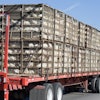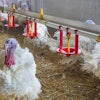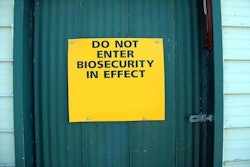
The avian influenza outbreak in the United States and Canada was a big surprise for 2022 and could dominate 2023 for turkey and layer farmers and integrators.
In a WATT Poultry Chat interview, Dr. Thomas Elam, president of FarmEconLLC, explained why the disease continues to spread and wondered why the story isn't getting more attention.
Austin Alonzo: What won't be so happy for this new year is the lingering avian influenza outbreak in the United States and North America. Why hasn't this outbreak ended yet?
Thomas Elam: That is an excellent question. I was just looking at the latest data from USDA, we've had the first commercial flock affected in the state of Washington, a layer flock. And we've had outbreaks this month in places like Tennessee a lot in Iowa, Minnesota, Colorado, all over the country.
And we as a country have prided ourselves on our biosecurity of poultry facilities. But, looking through some recent news on this particular virus, this H5N1 strain. It is never been seen, this exact strain, it has never been seen before. It appears to be a combination of two other strains.
In some ways, there's some parallels with the COVID pandemic, a novel new virus comes in and starts to affect things in ways that we haven't seen in recorded history, basically, not in this country anyway.
Normally, when the migrations are over, the wild bird migrations are done, these outbreaks stop but they have not stopped. They just continued along through November, December and I expect January and February.
We've seen this H5N1 virus go endemic in Southeast Asia, particularly in China. But it's a different strain. So, I don't know what we're going to do.
We definitely need to think about what we're doing in terms of biosecurity. Is there a hole in our armor somewhere that's letting this virus in? That we're not aware of? Is it strictly wild birds? Is it affecting other animals as well? I don't know. I wish I had a good answer.
I'm not a epidemiologist by any stretch of the imagination. But I find this deeply troubling that here we are in the middle of winter, the wild birds have all gone south. And yet we still are seeing widespread not, you know, overwhelming numbers, but episodes of this virus all over the country.
And I fear of what's going to happen in the spring when the birds come back north starting in February, March and April. And are we going to see a true pandemic of this virus spreading across the U.S. across all the major flyways? It's scary. I don't know how else to put it.
It's been amazing to me that it hasn't been more in the popular press. We've we've got a record number of birds now affected by this virus. Over 9 million turkeys. I think the last time we talked it was 7 million. It was 7.5 Maybe.
One thing that does seem to be consistent about it is it affects older birds, we have seen only a couple of million chickens, which is not when you look at the number of chickens we process every year. That's nothing. It's been mainly in turkey flocks, and layers. Older birds.
I don't think that the broiler industry is immune to this virus. But it doesn't seem to affect broiler chickens the way it does these big operations with a lot of large birds weighing 10, 20 pounds and higher.
There is no vaccine by the way either. I've looked into that there's they have no vaccine for this, this virus yet anyway, not be possible generate one but as soon as you start to vaccinate, then you run into major trade problems. Because you can't tell the difference between a vaccinated bird and an infected bird. The blood samples turn positive, regardless of whether it was just a vaccine or was the actual disease.
So, I wish I had better news. But obviously, if you're in the industry, you're following it closely. You realize, that this thing is real that we need to find out what's causing it, how it's being transmitted and start to look at different protocols for our biosecurity measures to try to stop it.
This transcript edited for length and clarity.


















